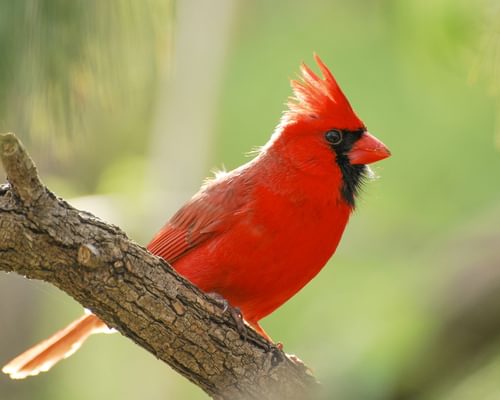If you've ever noticed a female cardinal suddenly disappear from your feeders in early spring, chances are she's started nesting.
Northern Cardinals are among the earliest birds to begin their family-raising duties, sometimes starting as early as February in warmer regions, though March and April are more typical.
Look for them scouting potential nest sites - the process can take up to two weeks of careful investigation.

Close up of a female Cardinal on the nest
The female does all the construction work, though you might spot her mate bringing her building materials.
She weaves a neat cup-shaped nest about 4 inches wide, using twigs for the outer layer and softer materials like grass and bark strips for the inner cup.
Watch how she shapes it - she'll actually sit in the center and turn around, using her body as a living template.
Within about a week of finishing, she'll lay 2-3 speckled eggs (sometimes up to 5), each about an inch long with a whitish-gray or greenish background dotted with brown spots.

Cardinals usually nest in secluded places - forks of thorny shrubbery and vines provide protection

Close up of Cardinal eggs
That male cardinal's not being lazy though - he's busy playing delivery service.
Watch for the touching sight of him feeding his mate right on the nest, carefully approaching with seeds and passing them to her beak-to-beak.
She rarely leaves the eggs unattended during the 11-13 days of incubation because of this dedicated room service.
The pair becomes remarkably picky about real estate during nesting season, usually tucking the nest into a dense tangle of branches about 5-7 feet off the ground, though some adventurous pairs might build as high as 40 feet up.

Three recently hatched Northern Cardinal chicks in the nest
Those rose bushes or thorny shrubs near your house? Perfect cardinal nurseries.
The thick cover and sharp thorns keep predators at bay, though it does make gardening interesting when there's a protective male cardinal keeping watch.
He'll switch from his usual melodious singing to sharp 'chip' calls if anything ventures too close to the nest.
Once the chicks hatch, they'll be ready to leave the nest in just 9-10 days, though the parents keep feeding them for up to eight weeks afterwards.

Cardinal nest with three unhatched eggs inside
The whole process repeats through the summer - cardinals typically raise 2-3 broods each season, sometimes even managing four if conditions are perfect.
By late August, you might spot the results: spotted juvenile birds with dark beaks following their parents around, begging for food.
The young ones look nothing like their parents at first, wearing plain brown feathers that help them stay hidden while they learn the ropes of cardinal life.

Female Cardinal feeding fledgling
Want to attract nesting cardinals? Native plants like American Elderberry and Wild Grape make perfect nesting spots.
Just remember - if you find a cardinal nest, it's best (and legally required) to leave it undisturbed until the family moves out, which usually takes about three weeks from egg-laying to fledging.

Male Northern Cardinal feeding hungry chicks inside the nest

